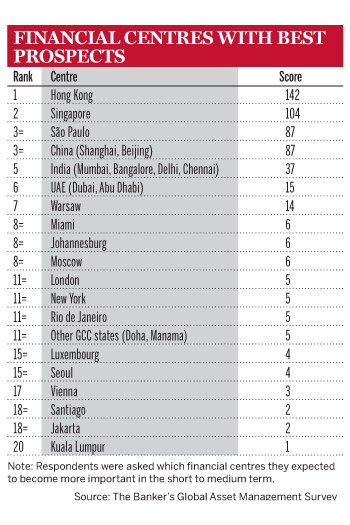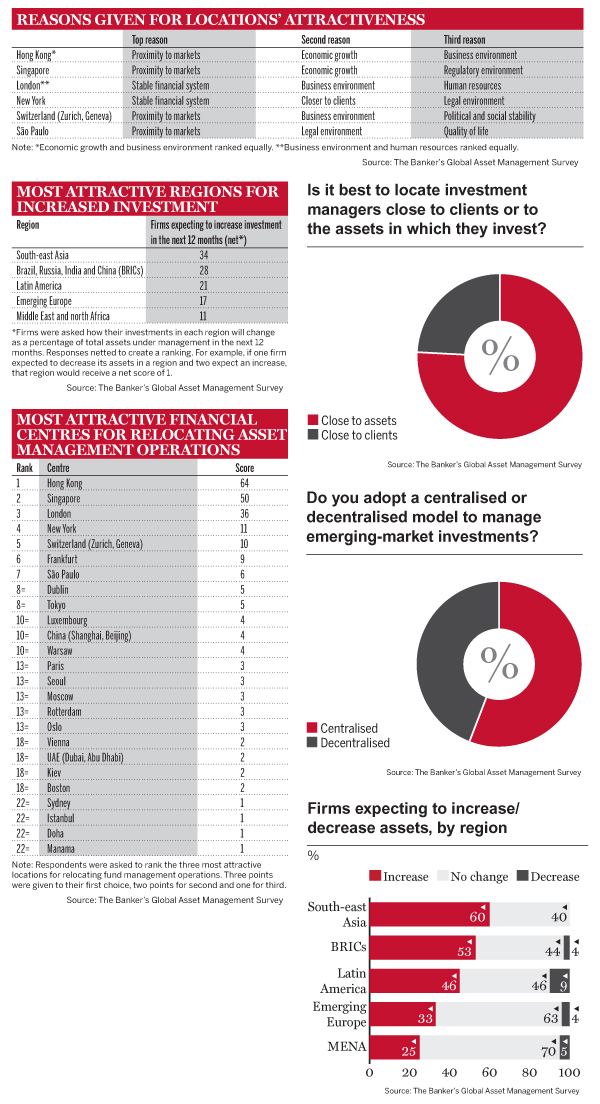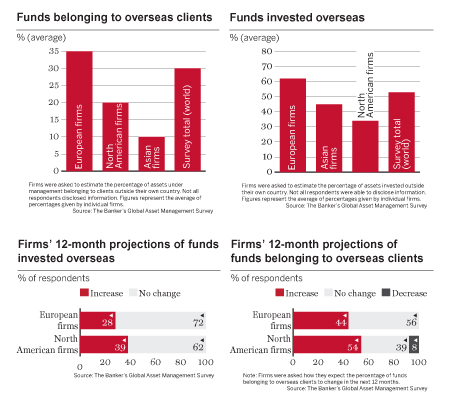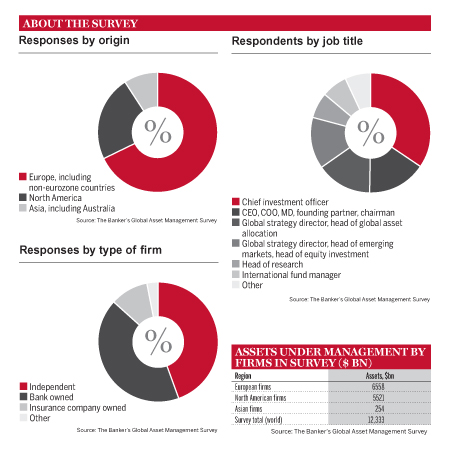Emerging markets key to asset management

With Europe and North America paralysed by sovereign debt crises, the majority of respondents to The Banker magazine’s global asset management survey are focused on Asia, with more than 50% expecting to increase investment in the region. Investment funds are expanding their operations in centres such as Hong Kong and Singapore, as the eastwards transfer of economic power gathers pace.
Investors have been quick to recognise the potential of moves to open the renminbi market. Prospects for the internationalisation of China’s currency and the convergence of the country’s offshore and onshore markets have focused minds and whetted appetites.
The Banker’s poll of senior decision-makers in the asset management industry found a clear consensus that investors are showing a new level of interest in emerging markets, particularly in south-east Asia and the BRIC countries of Brazil, Russia, India and China. Of these, Hong Kong is leading the race to become Asia’s dominant financial centre.
Editor's choice
The results bode well for both emerging markets in general and financial centres in those markets in particular. The majority of firms in our survey indicated a preference for locating fund managers in regional emerging market financial centres rather than head office, although a majority of firms still prefer a centralised decision-making strategy, particularly for regional asset allocation.
Large institutions typically make top-down asset allocation decisions from a head office (for example, how much they invest in one region versus another), but are becoming increasingly confident in letting local fund managers pick individual investments.
Global perspective
Young Chin, chief investment officer of Pyramis Global Advisors, the institutional asset management arm of US firm Fidelity, says: “Generally, we are seeing growth in all [emerging market] regions, as investors have clearly moved from a home market bias to having a more global perspective.
“Our institutional investors have shown particular interest in the emerging markets sector. And while the costs of [locating in emerging market regions] are greater, we see an enormous advantage to having investment professionals working in the same time zones as the markets in which we invest and serve our clients.”
Another US-based respondent says: “Some of the largest, long-only investment funds are changing their view towards emerging markets, talking up emerging markets bonds as a safe haven compared to developed countries. Clearly there has been a shift in sentiment and emerging markets are no longer seen as a risky asset.
The head of a Helsinki-based fund says: “At the same time as emerging markets have become more mainstream, there have also been improvements in corporate governance, allowing us to increase our investment.”
Outside appeal for US
European firms in the survey are the most regionally diverse in their investment holdings and client bases. On average, they reported holding 62% of their assets in investments outside their own country. By contrast, US firms averaged just 34% holdings in non-US domiciled assets. When asked whether this would increase, however, 39% of US firms say yes, compared with 28% of European firms.
“About 10% to 15% of our assets belong to clients outside North America, where our firm is headquartered,” says Mr Chin. “We do expect this proportion to increase in the future. This area is one of Pyramis’s strengths.”
Hong Kong takes the crown
Nowhere in the survey results is the shift towards emerging markets more clear than in the almost universal recognition of Hong Kong as an increasingly important financial centre – not just for China but for the whole of Asia. Hong Kong scored much higher than any other financial centre in all categories. When asked to name the most attractive location for relocating emerging markets operations, most firms said Hong Kong: it scored 25% higher than London and New York put together in this category.
HSBC Global Asset Management’s global head of macro and investment strategy Philip Poole says that with the internationalisation of China’s currency, Hong Kong will only gain in strength as a financial centre and as the gateway to China. “This is a market that will grow exponentially in the coming years. The Chinese authorities are keen to internationalise the renminbi and to do that they will need deeper and more liquid bond markets, which fits well with growing client demand for renminbi-denominated investments.”
Despite the fact that Singapore ranked second to Hong Kong in all the survey’s rankings of international financial centres, it remains a long-established centre for the fund management industry, offering advantages over its rival. It was universally praised for regulation, human resources and many other attributes.
Mr Poole says: “Like Hong Kong, Singapore also has a growing role as an offshore centre for Indian and Indonesian markets. It is a well-developed and well-regulated market within the Asian time zone with a good legal infrastructure. Everything is there and it all works.”
São Paulo – city of the future?
Several respondents mentioned the growing need for a global financial centre in Latin America and there was an almost unanimous view that São Paulo was the obvious choice. However, many cited operational difficulties and questioned the Brazilian government’s long-term commitment to the development of an international financial centre. The CIO of one US-headquartered fund management firm says: “Brazil is clearly the hub for Latin America, but government measures are not encouraging”.
One Paris-based CIO gives a similar view: “We don’t see it yet, but something similar [to the growth of Hong Kong and Singapore] is expected in South America in next five years or so. The biggest question remains the development of a mainland financial centre in China and this depends on the authorities. Shanghai would be well placed if the Chinese decide they want a mainland financial centre.”
Other specialist investors such as private equity firms were also looking closely at Beijing as an operational centre.
Fading empires
The real surprise of the survey, however, is not that investors named south-east Asia and the BRIC countries as the most attractive regions for increased investment, but the speed at which economic power is shifting from developed economies. Several investors described the weakened appeal of traditional financial centres in the wake of the financial crisis compared with the emerging market regions, with their prospects of sustained economic growth and lower costs.
Firms showed a surprisingly universal lack of interest in relocating or increasing operational investment in traditional centres such as London and New York. One respondent says: “London is good, but it’s not getting any better. It’s just less exciting now compared to Asian centres such as Hong Kong and Singapore.”
Other respondents recognised London’s continued importance as both a global financial centre and key location for managing emerging market investment. One respondent says: “It remains a far more important financial centre for emerging markets than any of the emerging market financial centres.”
One US fund manager whose firm has more than $500bn under management, says: “London is a key centre for us because of time zones – we can speak to both Asia and America in the same day.”
HSBC’s Mr Poole points out that uncertainty over the euro can only work in London’s favour. “The question over the euro’s future plays directly into London’s hands as the centre of European markets relative to continental centres such as Frankfurt, Paris and smaller eurozone markets that have done well because of the euro.”
Global, not local
A different reason for London’s enduring attractiveness was given by the head of emerging markets equities at one of North America’s largest investment firms: “The trend towards global funds rather than regional funds has made London more attractive as it is a truly global financial centre.”
Praise for London was heavily peppered with complaints, however, particularly over taxation. One US executive at a large US fund was particularly disparaging. When asked which financial centres were most attractive for locating fund management operations, he replied: “Not London, because of the rising taxation. Nobody will want to be based in London.”
The executive director of a London-based specialist fund says: “People are starting to question the tax structures in London, and Switzerland will probably be the main beneficiary [of this]. London still has the [best] infrastructure, but for some funds, and hedge funds in particular, relocating to Switzerland is not that hard. But the UK is also tightening up how much time non-residents can spend in the UK.”
Co-locating funds and managers
Many of the smaller financial centres are gaining recognition from investment funds eager to relocate fund managers closer to the markets in which they invest. Investors are clearly interested to see the development of regional financial centres outside Europe, North America and south-east Asia. One US-based CIO says: “There has to be a major regional financial centre in Brazil, India and mainland China sometime soon, but it’s not really obvious yet that this has become a reality.”
Lynnette Ferguson, research director at London-based hedge fund specialist Financial Risk Management, says: “São Paulo has become the natural hub for Latin America due to the size and depth of Brazil’s financial markets. São Paulo has by far the highest number of hedge funds in the region and is the obvious place for service providers and investors to locate.”
However, investors also expressed frustrations with São Paulo, arising from regulatory distortions, bureaucracy and other operational difficulties. “Being based in Brazil with its high bureaucracy and taxes would be tough right now,” says one emerging markets investor at a large European fund.
Thinking small
Meanwhile some smaller centres in more developed regions are also gaining increased recognition from investors, many offering niche support in areas such as IT, legal and trading services. “It can be much easier to get things done in a small centre,” says one London-based investment director, “particularly from a regulatory point of view.” He adds that “in centres such as Luxembourg or Singapore, we’ve found the authorities deeply committed to the financial services sector and able to respond quickly with a consensus viewpoint on a particular issue”.
Two European firms, one from the UK and one from Denmark, praise Warsaw as a low-cost location for investing in eastern Europe. Similarly, Desjardins Asset Management’s chief operating officer, Gregory Chrispin, says that Poland is becoming an important centre for mid-office, back-office and risk operations, and also IT and transaction processing.
Several investors expressed interest in the growth of smaller financial centres such as Mumbai, Seoul, Johannesburg, Cairo and the Gulf states. One mentioned Saudi Arabia as a possible future location, although some investors expressed concerns about political instability across the Middle East and north Africa.
One executive says he could see a business argument for locating in the Gulf region and the Middle East, but mentioned cultural differences as a hurdle. “Some regions, not just those in the Middle East, still have to open themselves up a bit more towards other cultures before international companies will invest.”
Another executive based in France says he has been approached by emerging financial centres inviting his firm to open offices, but that proposals have generally lacked the operational details needed to set up a fund management business in those jurisdictions.
To centralise or not?
While advances in IT have made it easier for fund managers to centralise operations in home markets, they have also made it easier to relocate managers overseas. Respondents gave convincing arguments both for and against centralising operations. Georges Farré, head of alternative funds, global emerging bonds and currencies at Dexia Asset Management, manages a fund of which roughly 50% is already invested in south-east Asian assets and he expects this to rise in the next 12 months. The fund’s management operations are centralised in Paris and Mr Farré sees little reason to change this.
“We look at macro data which can be done from anywhere in the world. And thanks to conference calling you also don’t need to be close to clients geographically,” he says.
Another CEO says his firm valued the objectivity, transparency and ease of locating all fund managers in one head office at a distance from the markets in which they invest.
Peter Ferket, CIO of equities and co-head of investment products at Robeco Asset Management (owned by Rabobank) in the Netherlands, says that although the best access to information comes from locating investment managers close to assets, client needs must come first. “For us it’s about understanding the clients’ needs, not just pushing products.” Robeco, which manages about €150bn across a wide range of assets, has an active investment style making close client communication important.
About the survey
The Banker magazine’s global asset management survey is based on responses from more than 60 international asset management firms together representing a total of funds under management of more than $12,000bn (at the highest level of consolidation). This represents nearly one-fifth of the total management by the world’s 500 largest fund management firms.
Responses were gathered by telephone interviews and written questionnaires e-mailed in August and early September. Where investors were not active in a region and did not expect to become active, or did not give a response, an entry of 'no change' was recorded.







